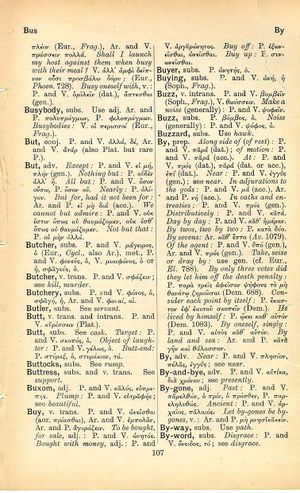but: Difference between revisions
From LSJ
ἑτέρως ἠδύνατο βέλτιον ἢ ὡς νῦν ἔχει κατεσκευάσθαι → otherwise they could have been constructed better than they are now (Galen, On the use of parts of the body 4.143.1 Kühn)
(CSV3) |
mNo edit summary |
||
| Line 6: | Line 6: | ||
'''adv.''' | '''adv.''' | ||
[[except]]: P. and V. εἰ μή, [[πλήν]] (gen.). | |||
[[nothing but]]: P. οὐδὲν ἀλλʼ ἤ. | |||
[[all but]]: P. and V. ὅσον [[οὔπω]], P. ὅσον οὐ. | |||
[[nearly]]: P. ὀλίγου. | |||
[[but for]], [[had it not been for]]: Ar. and P. εἰ μὴ διά (acc.). | |||
[[we cannot but admire]]: P. and V. οὐκ ἔστιν [[ὅπως]] οὐ θαυμάζομεν, οὐκ ἔσθʼ [[ὅπως]] οὐ θαυμάζομεν. | |||
[[not but that]]: P. οὐ μὴν [[ἀλλά]]. | |||
}} | }} | ||
Revision as of 12:40, 25 September 2019
English > Greek (Woodhouse)
conj.
P. and V. ἀλλά, δέ, Ar. and V. ἀτάρ (also Plat. but rare P.).
adv.
except: P. and V. εἰ μή, πλήν (gen.).
nothing but: P. οὐδὲν ἀλλʼ ἤ.
all but: P. and V. ὅσον οὔπω, P. ὅσον οὐ.
nearly: P. ὀλίγου.
but for, had it not been for: Ar. and P. εἰ μὴ διά (acc.).
we cannot but admire: P. and V. οὐκ ἔστιν ὅπως οὐ θαυμάζομεν, οὐκ ἔσθʼ ὅπως οὐ θαυμάζομεν.
not but that: P. οὐ μὴν ἀλλά.

